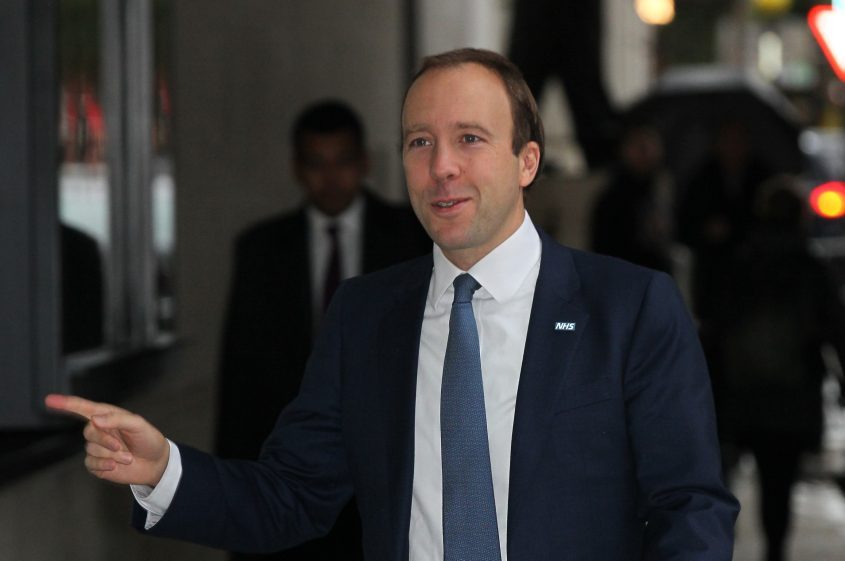Matt Hancock’s appearance at a Taxpayers’ Alliance (TPA) event last month raised eyebrows. As many on twitter rightly asked, why is the Health Secretary teaming up with a lobby group that has long wanted to do away a state-funded healthcare system?
The TPA’s latest report, Embracing technology in health and social care, for which Hancock wrote the foreword, marks a departure for the lobby group away from its usual demand for cuts. (Asked why the change in direction, its CEO said only “austerity is over, so…”).
Instead the TPA report calls for more investment in technology and increased automation to save the NHS money. In this, it has joined an established network of lobbyists championing the idea that technology will save the NHS, each echoing the assertions of the last.
Lifted figures
The TPA’s figures, for example, are lifted from a 2018 report by the ‘progressive’ think tank, the IPPR, including its ‘key finding’ that the NHS could save £12.5bn a year through improved productivity from automation.
(The IPPR was quick to distance itself from the TPA, saying that it has ‘twisted’ its research and its proposals for the NHS were ‘very different’. In truth, there’s not much between the IPPR’s press release last year and the recent TPA one).
Last year’s IPPR’s report came in for criticism, however, including in the BMJ, for showing ‘no workings or figures, no appendices to explain how these extraordinary efficiencies were calculated’. So, where did the IPPR (and consequently the TPA) get its figures on the potential for technology to save the NHS billions?
From US management consultants, McKinsey. Tom Kibasi, the IPPR’s current director was more than a decade at McKinsey where he led its work on ‘innovative healthcare delivery’, so perhaps this is no surprise.
The IPPR says the figures in its report, Better health and care for all: A 10-point plan for the 2020s, are the result of analysis of work by McKinsey on the potential for automation across industries, including healthcare.
They are not the only ones, however, to rely on McKinsey’s number crunching when it comes to the promise of health tech.
McKinsey’s links
The firm has also produced similar for NHS England. An ‘evidence summary’ by McKinsey from 2014, which was released under freedom of information law, said that with a substantial investment in technology the NHS could achieve savings of between £8.3 billion and £13.7 billion.
NHS England’s then national director for tech, Tim Kelsey – formerly of McKinsey – used the figures to call for the NHS to spend billions on embracing digital technology. McKinsey also provided the NHS with 22 recommendations to drive its adoption.
The problem is that the figures McKinsey provided to NHS England, according to an academic in health information, were ‘an educated guess’. “It’s not evidence at all,” Dr Philip Scott, a senior lecturer at the University of Portsmouth’s Centre for Healthcare Modelling and Informatics, told Digital Health News having looked at McKinsey’s summary for NHS England.
The suggestion that investment in technology could save up to £13.7 billion was “an unfounded claim”, said Dr Scott. “It’s not based on anybody actually having done it. It’s based on what we think it ought to do.” The potential savings had “the ring of being very optimistic estimates,” he said.
Unquestioned
Regardless, the message that digitisation and automation are the answer to the NHS’s problems continues to be repeated without question, particularly in policy-making circles.
Just weeks before the TPA event, a day-long health policy conference in Westminster – sponsored by McKinsey – discussed the inevitability of technology ‘transforming’ healthcare.
Penny Dash, a senior partner at McKinsey who has long been involved in market reform of the NHS, spoke alongside NHS England’s outgoing deputy CEO, Matthew Swindell, who is rejoining the private sector. She explained how healthcare leaders can ‘eliminate the roadblocks’ to technological change.
Next month, Hancock will also be guest of honour at the annual health conference of the free market think tank Reform (funded by, among others, McKinsey). The topic of the conference? ‘Unlocking the promise of digital health’.
For years, McKinsey has been a leading advocate for the use of more technology in healthcare, including the NHS.
It was involved, for example, in Tony Blair’s £12bn NHS National Programme for IT, now know as the ‘biggest IT failure ever seen’. It was also involved in discussions around the NHS’s doomed data-sharing project, Care.data, which was also eventually scrapped.
Writing in the BMJ about his concerns with the IPPR report, David Oliver concluded that ‘over claiming about technology’ is more likely to be ‘driven by industry lobbying, marketing [and] the financial bottom line’, than by evidence.
Despite McKinsey’s heavy involvement in the health service – in 2012 it was described as the ‘firm that hijacked the NHS for its extensive involvement in Andrew Lansley’s disastrous market reforms – it earns most of its money consulting for the private sector.
It has always refused to name its clients, but they are known to include some of the world’s largest healthcare and drugs firms.
So, while we absolutely should demand to know who is behind the Taxpayers’ Alliance and its recent lobbying for health tech, it’s arguably more important that we know who else McKinsey works for.
Dear Reader,
If you like our content please support our campaigning journalism to protect health care for all.
Our goal is to inform people, hold our politicians to account and help to build change through evidence based ideas.
Everyone should have access to comprehensive healthcare, but our NHS needs support. You can help us to continue to counter bad policy, battle neglect of the NHS and correct dangerous mis-infomation.
Supporters of the NHS are crucial in sustaining our health service and with your help we will be able to engage more people in securing its future.
Please donate to help support our campaigning NHS research and journalism.


